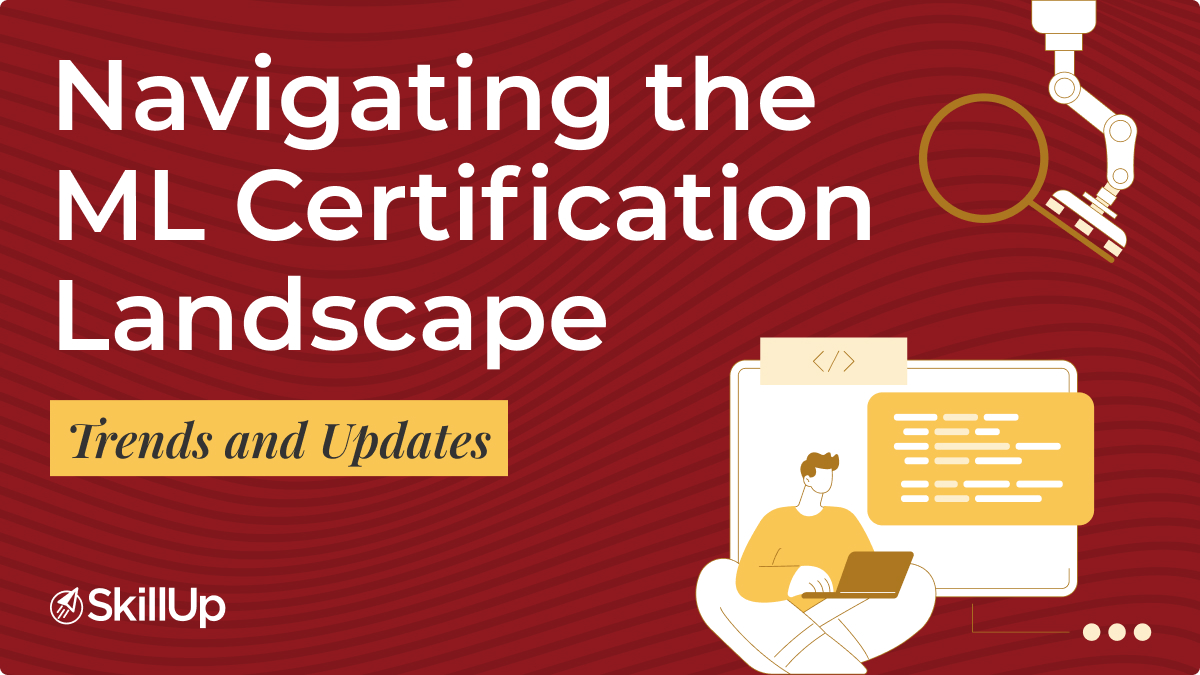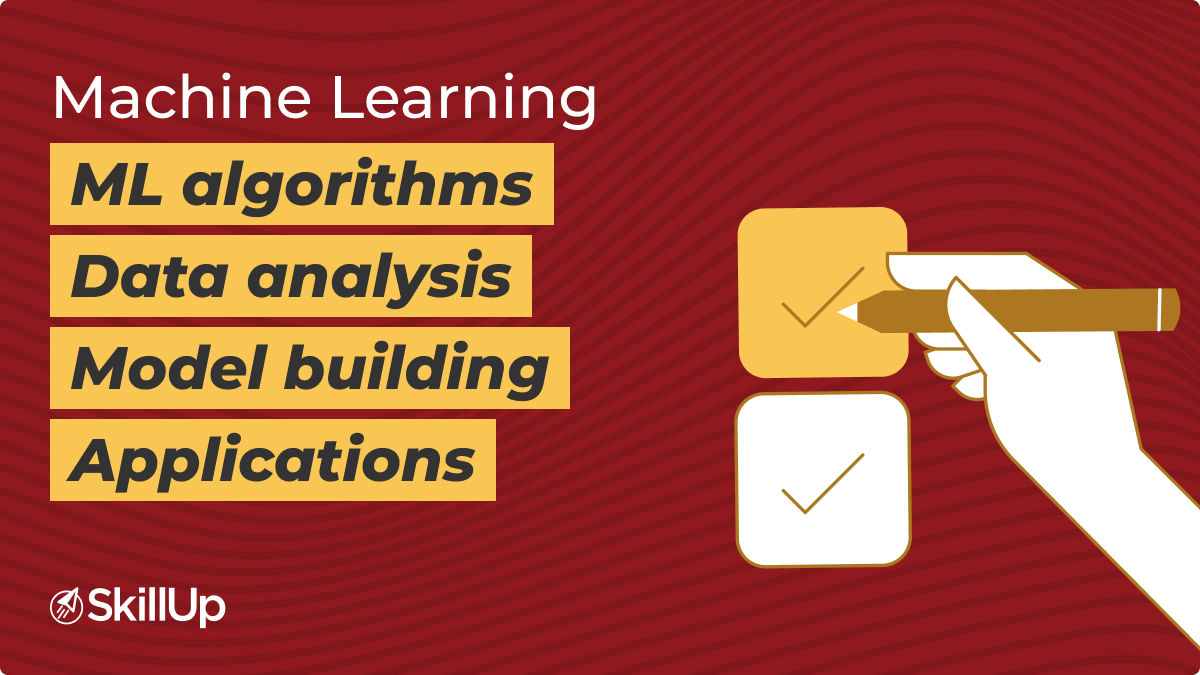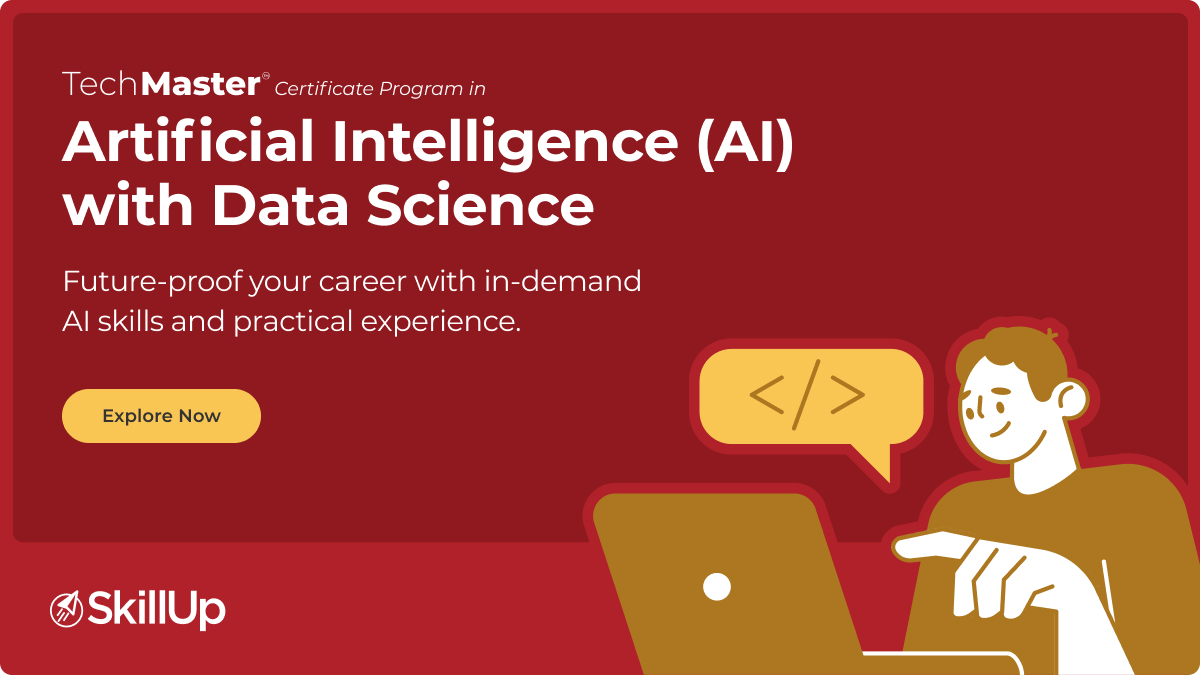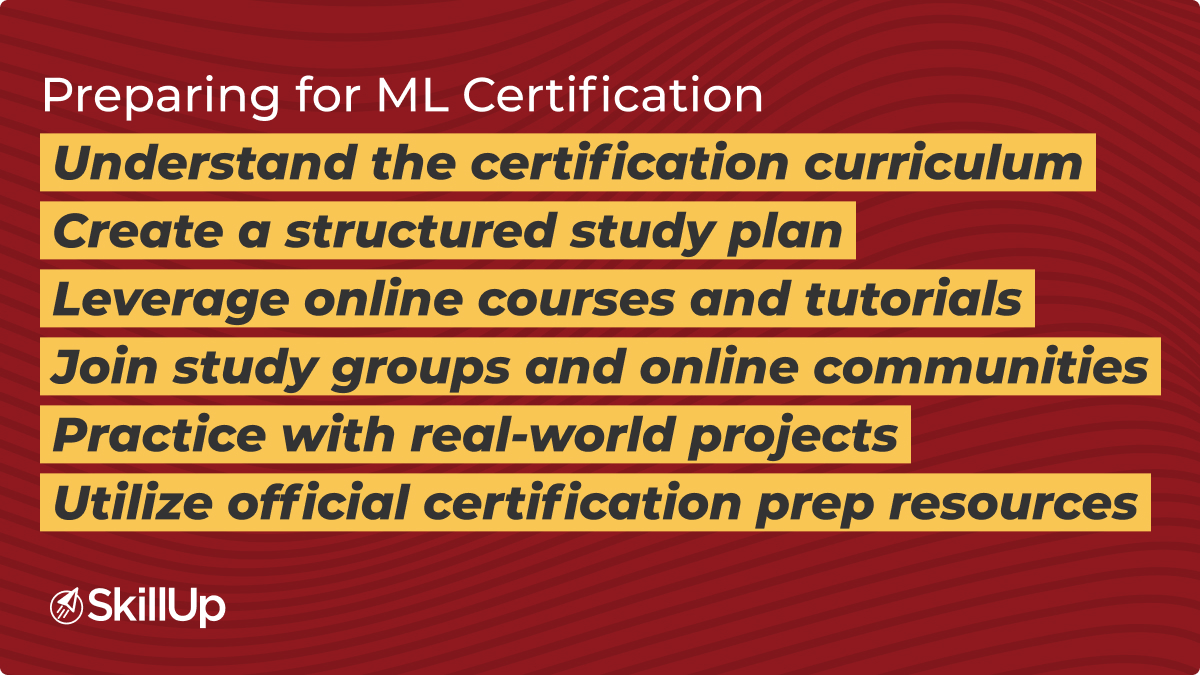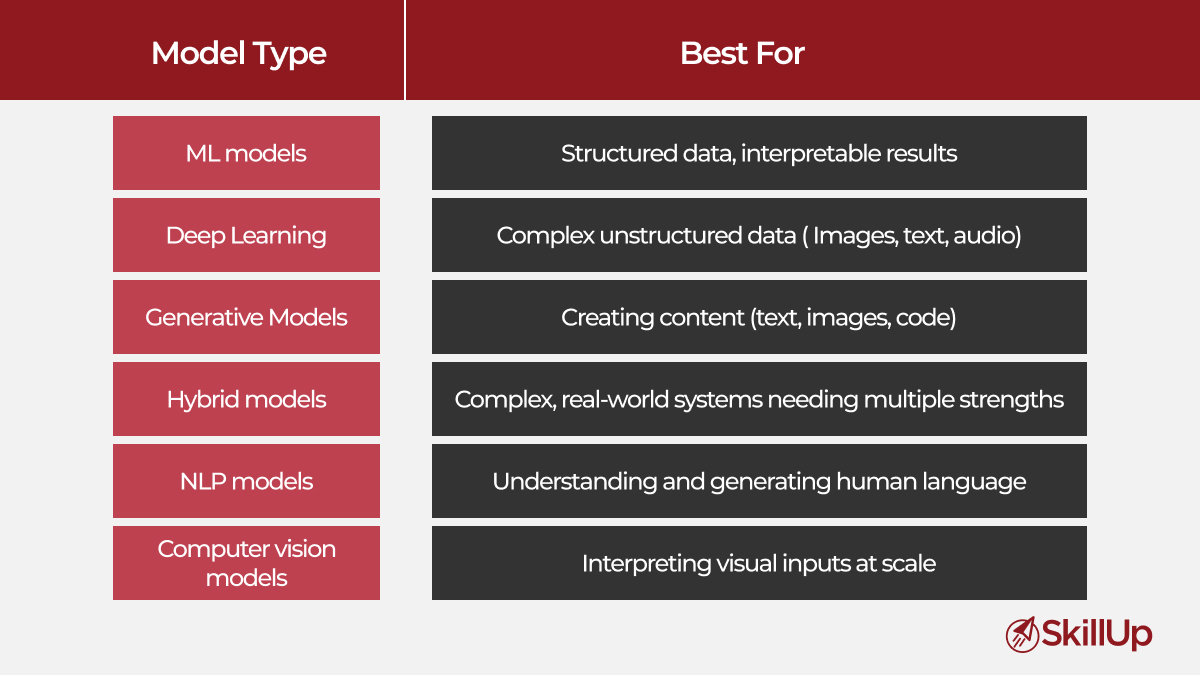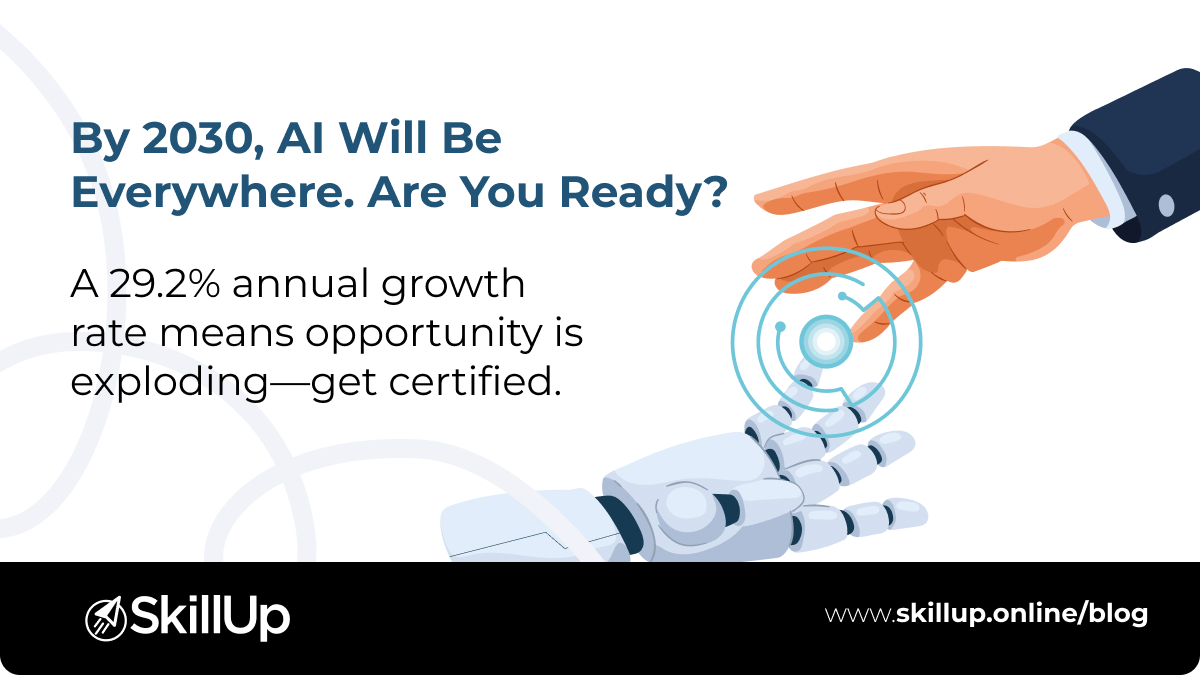With data growing exponentially and machine learning (ML) applications becoming increasingly integral to business solutions, the demand for skilled ML professionals has never been higher. This surge has spotlighted the critical role of ML certifications, not just as a benchmark of expertise but as a pivotal step for carving a niche within the domain. This blog aims to be your compass, guiding you through the latest trends, essential certifications, and how they can catalyse your career growth in 2024 and beyond.
Machine Learning Certifications Overview
Machine Learning certifications are designed to validate an individual’s skills in ML algorithms, data analysis, model building, and the application of ML in real-world scenarios. But what sets these certifications apart from conventional degrees or self-taught expertise?
Firstly, ML certifications are often more focused and compact, offering targeted learning paths directly applicable to industry needs. They are structured to provide practical, hands-on experience with tools and technologies that are in high demand, ensuring that learners are job-ready upon completion.
Moreover, these certifications are recognized by leading tech companies and organizations worldwide, making them a valuable asset for anyone looking to enhance their resume. The ML certification spectrum caters to various skill levels and career aspirations, from foundational courses for beginners to advanced specializations.
Whether you’re a beginner looking to make your mark in the tech world or an experienced professional aiming to stay ahead of the curve, understanding the value and structure of ML certifications is the first step towards unlocking new career opportunities.
Exploring further insights on this topic can be highly beneficial for contemplating the broader field of AI and its relation to data science. The blog “Should I Choose a Career in AI or Data Science?” is a great resource offering valuable perspectives on navigating career choices in these dynamic fields.
Top ML Certifications in 2024
In 2024, the machine learning landscape continues to evolve, bringing forth many certification options for aspiring and established ML professionals. Identifying the most impactful certifications can set you on a path of accelerated career growth and open doors to new opportunities. Here are some of the top ML certifications that are making waves in the industry this year:
- Certified Machine Learning Professional (CMLP) – Offered by reputable tech education institutions, the CMLP certification focuses on core ML principles, algorithmic understanding, and practical applications. This certification is ideal for solidifying their foundational knowledge and applying ML techniques in real-world scenarios.
- Advanced Machine Learning Specialization – Hosted on leading online learning platforms, this specialization deepens into complex topics such as neural networks, deep learning, and reinforcement learning. It’s tailored for individuals seeking to advance their expertise and tackle cutting-edge ML challenges.
- Machine Learning Engineer Certification – Recognized by major tech companies, this certification validates skills in designing, building, and deploying ML models. It’s geared towards engineers who want to demonstrate their ability to integrate ML solutions into scalable production environments.
- Data Science and Machine Learning Bootcamp Certification – Combining data science and ML, this bootcamp-style certification offers an intensive, hands-on learning experience. It covers everything from data preprocessing to advanced ML algorithms, catering to learners who prefer immersive, project-based training.
- AI and Machine Learning with Python Certification – Focusing on Python’s role in ML, this certification emphasizes programming skills, data manipulation, and model creation using Python’s robust libraries. It’s perfect for individuals who harness Python’s capabilities in developing ML solutions.
Choosing the proper certification depends on your current skill level, career goals, and the specific ML domain you are interested in.
For individuals eager to embark on a comprehensive learning journey, the TechMaster Certificate Program in Artificial Intelligence (AI) with Data Science offers a blend of foundational AI concepts and practical data science applications, ideal for aspiring ML professionals. Additionally, the Python for Data Science course can be an excellent starting point for you, addressing your interest in leveraging Python for ML solutions.
Emerging Trends in ML Certifications
The field of machine learning is not just growing; it’s evolving at an unprecedented pace. Several emerging trends are reshaping the ML certification landscape, reflecting the latest industry demands and technological advancements. Understanding these trends is crucial for anyone looking to stay ahead in their ML career. Here are the key trends to watch:
- Specialization in Niche Areas: As ML applications broaden, there’s a growing demand for certifications that offer specialization in niche areas such as natural language processing (NLP), computer vision, and robotics. These specialized certifications allow professionals to distinguish themselves in specific domains of ML.
- Ethics and Responsible AI: With greater power comes greater responsibility. The ethical use of AI and ML is becoming hot, leading to certifications emphasizing ethical practices, data privacy, and responsible AI development.
- Integration with Cloud Technologies: Cloud platforms are becoming the standard environment for deploying ML models. Certifications that combine ML expertise with cloud technology proficiency, such as AWS, Azure, or Google Cloud, are gaining traction.
- Auto ML and No-Code ML Solutions: The rise of AutoML and no-code platforms is democratizing access to ML, with certifications starting to cover these tools to cater to professionals who may not have a profound programming background.
- Continual Learning and Adaptation: With the rapid pace of innovation in ML, certifications are increasingly focusing on teaching how to continually learn and adapt to new technologies rather than just mastering the current state of the art.
For professionals looking to merge their ML expertise with cloud technologies, the DP-100: Designing and Implementing a Data Science Solution on Azure course offers a perfect blend of data science and Azure cloud services, equipping learners with the skills needed to thrive in cloud-integrated ML environments.
Choosing the Right ML Certification for Your Career
Selecting the proper machine learning certification can be a pivotal decision in your career trajectory. With many options available, it’s essential to align your choice with your career goals, current skill level, and the specific demands of the industry you’re interested in. Here are some guidelines to help you make an informed decision:
- Assess Your Current Skill Level: Begin by evaluating your current machine learning expertise. Are you a novice looking to gain a foundational understanding, or do you have some experience seeking to specialize further?
- Identify Your Career Objectives: Consider where you see yourself in the next few years. Are you aiming to become a data scientist, an ML engineer, or a specialist in a niche area like NLP or computer vision?
- Research Industry Demands: Different sectors may value certain certifications over others. Look into the specific requirements of industries you’re interested in, such as finance, healthcare, or tech.
- Consider the Certification’s Reputation and Network: Opt for certifications from recognized institutions or platforms offering networking opportunities with peers and industry professionals.
- Evaluate the Learning Format and Resources: Some prefer self-paced online courses, while others benefit more from structured, instructor-led programs. Additionally, consider the practical components and real-world project opportunities offered.
- Look for Hands-on Experience: Given the practical nature of ML, certifications that offer hands-on projects and real-world problem-solving will be more beneficial.
Understanding the broader landscape of AI and data science can provide a solid foundation at the beginning of your ML journey. The blog “Demystifying Data Science: A Beginner’s Guide to Starting Your Journey” offers valuable insights into the field, helping novices make more informed decisions about their certification choices.https://skillup.online/blog/demystifying-data-science-a-beginn
Additionally, for learners who prefer a more structured approach to gaining hands-on experience in ML, the Analyzing Data with Python course can be an excellent starting point. This course provides practical data manipulation and analysis skills, foundational for any ML career path.
Preparing for an ML Certification: Tips and Resources
Earning an ML certification requires dedication, strategic planning, and access to the right resources. Here are some essential tips and resources to help you prepare effectively and increase your chances of success:
- Understand the Certification Curriculum: Start by thoroughly reviewing your chosen ML certification’s curriculum and exam requirements. It will give you a clear understanding of the topics you must master.
- Create a Structured Study Plan: Allocate specific times in your study schedule. Breaking the curriculum into manageable sections can make the learning process less overwhelming and more achievable.
- Leverage Online Courses and Tutorials: Utilize reputable online platforms that offer courses aligned with your certification’s curriculum. Interactive tutorials and hands-on projects can significantly enhance your understanding.
- Join Study Groups and Online Communities: Engaging with peers pursuing ML certifications can provide moral support, insights, and valuable tips from those who have successfully navigated the process.
- Practice with Real-World Projects: Apply what you’ve learned by working on real-world problems. This practical experience is invaluable and can make a significant difference in understanding complex concepts.
- Utilize Official Certification Prep Resources: Many certification programs offer official study guides, sample questions, and practice exams. These resources are tailored to help you familiarize yourself with the exam format and question types.
For learners looking for comprehensive preparation materials, the DP-100: Designing and Implementing a Data Science Solution on Azure course offers an in-depth exploration of data science solutions on Azure, aligning with the skills needed for various ML certifications.
The blog post “Mastering AI Certifications – Tips and Tricks” also provides further strategies and insights into effectively preparing for AI and ML certification exams.
The Impact of ML Certifications on Career Growth
In the fast-paced and competitive field of machine learning, certifications can be a powerful catalyst for career advancement. They validate your skills and signal your commitment to professional development. Here’s how an ML certification can impact your career; they:
- Enhance Credibility and Recognition: Holding a recognized ML certification can significantly improve your credibility in the eyes of employers. It is a testament to your expertise and dedication to staying at the forefront of technological advancements.
- Give You Access to New Opportunities: With an ML certification, you’ll likely gain access to a broader range of job opportunities, including roles requiring certified professionals. It can open doors to positions in leading tech companies and innovative startups.
- Increase Your Earning Potential: Certified ML professionals often enjoy a competitive edge in salary negotiations. The specialized skills and knowledge verified by a certification can lead to higher compensation than non-certified peers.
- Enable Professional Network Expansion: Certification programs often include collaborative projects and community interactions, providing valuable opportunities to connect with other professionals and industry experts. This expanded network can be instrumental in career growth and opportunities.
- Provide Continuous Learning and Skill Enhancement: Preparing for and obtaining an ML certification encourages continuous learning, ensuring that you remain updated with the latest trends, tools, and methodologies in the field.
- Empower You to Position for Leadership Roles: Advanced ML certifications can position you for leadership and specialized roles within organizations, as they demonstrate technical proficiency and a commitment to advancing the field.
For individuals who are considering the broader implications of ML certifications on their careers, the blog post How AI Certification Can Skyrocket Your Career offers insights into how certifications, particularly in AI and ML, can serve as a lever for career transformation and success.
Navigating Challenges in the ML Certification Journey
Pursuing an ML certification is a commendable ambition, but it is challenging. From mastering complex concepts to balancing study time with professional commitments, the journey requires resilience and strategic planning. Here are some common hurdles and strategies to overcome them:
- Complex Concepts and Advanced Mathematics: ML involves intricate algorithms and advanced mathematical concepts. Strengthening your foundation in statistics, calculus, and linear algebra can demystify complex topics and enhance your comprehension.
- Keeping Pace with Rapid Technological Changes: The field of ML is continuously evolving, making it challenging to stay current. Engaging with ongoing learning resources, attending workshops, and following industry leaders can keep you updated.
- Balancing Study with Professional Obligations: Many aspiring ML professionals juggle certification studies with full-time jobs. Creating a structured study schedule, utilizing weekends and early mornings, and setting realistic goals can help manage this balance.
- Access to Quality Resources: With abundant information, identifying high-quality, relevant study materials is crucial. Review recommended textbooks, reputable online courses, and official certification prep materials.
- Hands-on Experience: Gaining practical experience with real-world data sets and projects can be challenging. Participate in hackathons, contribute to open-source projects, or work on personal ML projects to build a portfolio of practical work.
- Exam Anxiety: The pressure of certification exams can be daunting. Regular practice tests, mindfulness techniques, and joining study groups for moral support can alleviate anxiety and boost confidence.
For individuals encountering challenges in understanding foundational ML concepts, the blog post Demystifying Data Science: A Beginner’s Guide to Starting Your Journey offers a clear and concise introduction to the field, easing the transition into more advanced ML topics.
Take Your Next Step in the ML Journey
Navigating the ML certification landscape involves continuous learning, strategic preparation, and practical application. The proper certification can significantly impact your career trajectory, whether you’re just starting or looking to advance your skills.
If you’re eager to build the necessary skills and kickstart your journey in machine learning, our Learner Support Team is here to help. Contact us at [email protected], and we’ll gladly guide you on your next steps. With the proper guidance and resources, your journey in the dynamic world of data science is just beginning.
SkillUp Online
